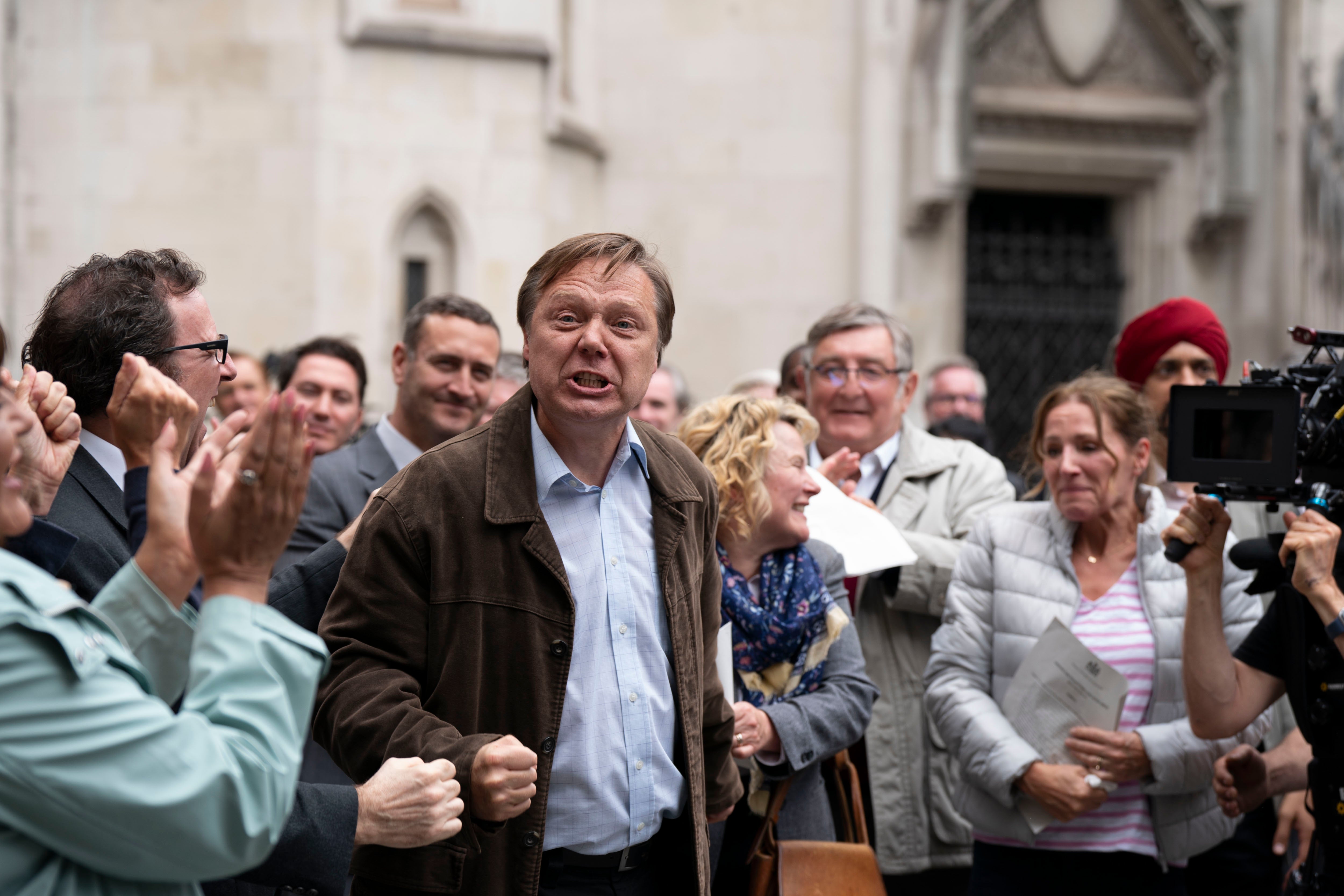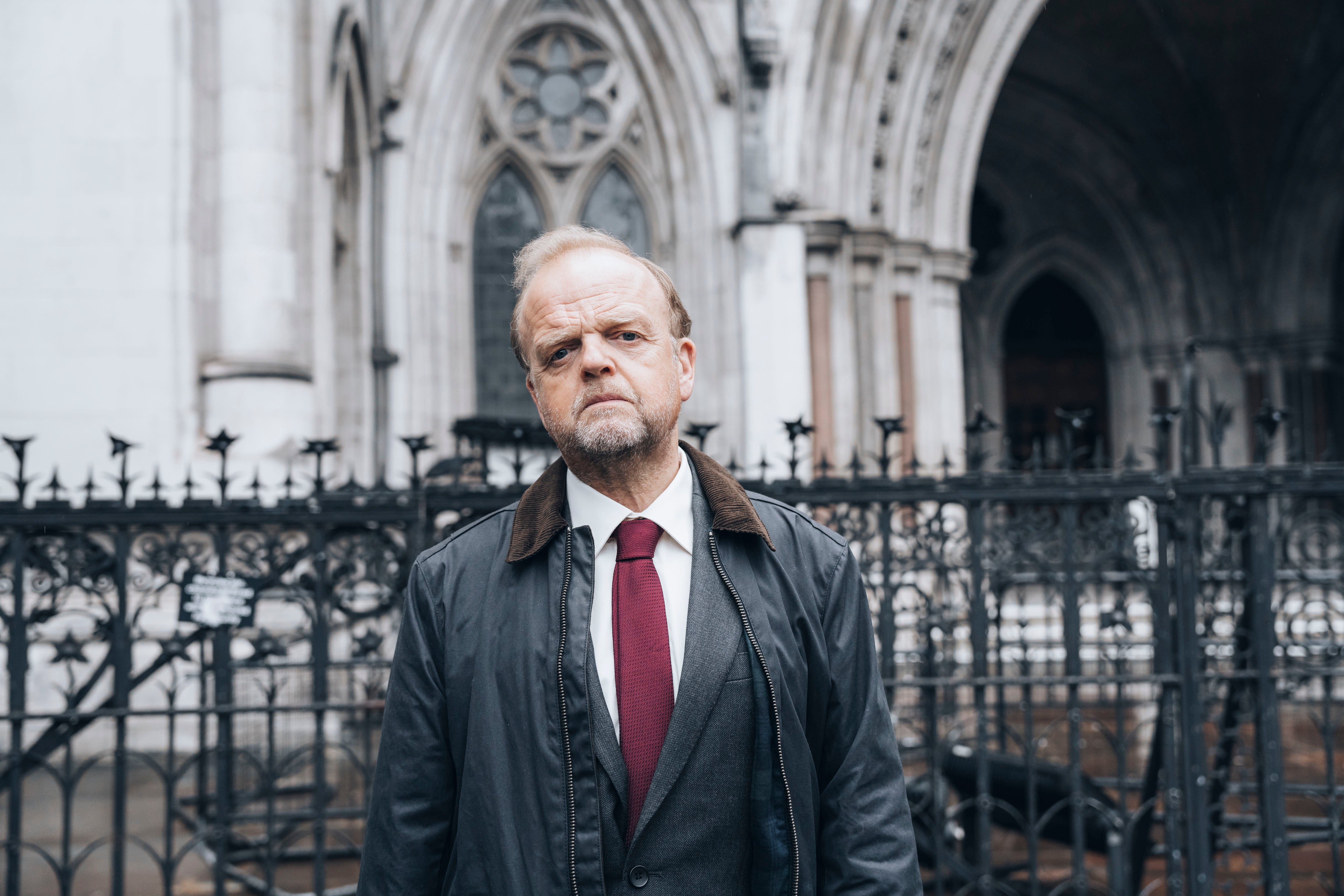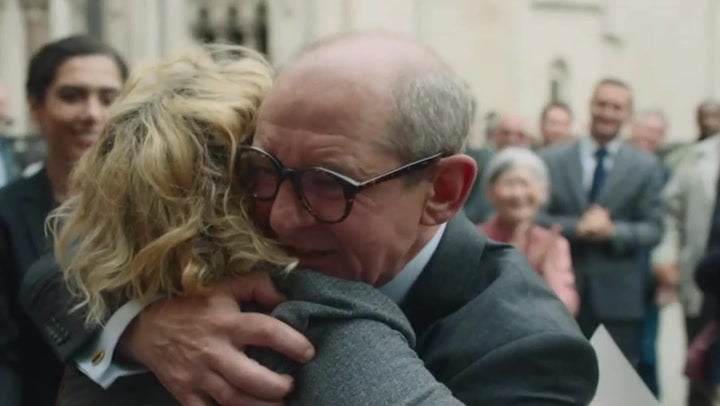‘We tapped into the nation’s rage’: The creators of Mr Bates vs the Post Office on the drama’s colossal impact
The ITV series about the Post Office scandal is swiftly becoming one of the most influential dramas of all time. Its writer Gwyneth Hughes and producer Patrick Spence tell Ellie Harrison they are astonished by the reaction – and explain what a real win will look like for the victims


Your support helps us to tell the story
From reproductive rights to climate change to Big Tech, The Independent is on the ground when the story is developing. Whether it's investigating the financials of Elon Musk's pro-Trump PAC or producing our latest documentary, 'The A Word', which shines a light on the American women fighting for reproductive rights, we know how important it is to parse out the facts from the messaging.
At such a critical moment in US history, we need reporters on the ground. Your donation allows us to keep sending journalists to speak to both sides of the story.
The Independent is trusted by Americans across the entire political spectrum. And unlike many other quality news outlets, we choose not to lock Americans out of our reporting and analysis with paywalls. We believe quality journalism should be available to everyone, paid for by those who can afford it.
Your support makes all the difference.On New Year’s Day, TV producer Patrick Spence sent an email to the creative team behind ITV drama Mr Bates vs the Post Office. “It was just warning them, kindly, that we were going to be killed in the overnight ratings by BBC One’s The Tourist, and then later in the week by The Traitors,” he says. Spence was confident that their show – about one of the greatest miscarriages of justice in British history – was good enough, important enough and moving enough to slowly find its audience. But he didn’t think it would take off straight away. “The tone of the email was ‘don’t be disheartened’,” he recalls.
He was completely wrong. Some 3.5 million people watched the first episode that night, a figure that has now climbed to 9.2 million, making it ITV’s biggest new drama for three years. It has propelled the scandal – in which more than 700 postmasters, between 1999 and 2015, were convicted after faulty Fujitsu software made it appear as though money was missing from their branches – to the front pages of newspapers for days. And on Wednesday, the PM announced a new bill that will grant unprecedented blanket acquittal to those wrongly convicted. The former head of the Post Office, Paula Vennells, has handed back her CBE thanks to public outrage following the show. And the man at its centre – Alan Bates, the former subpostmaster who’s led a decades-long campaign for justice – has been invited on a luxury trip to Necker Island, after Richard Branson was moved by his story.
“This past week has been surreal,” says Spence. I’m speaking to him and the show’s writer, Gwyneth Hughes, hours before Rishi Sunak’s announcement at PMQs. They are anticipating Sunak’s move and their excitement is palpable. “Our stated intent when we made this drama was simply that the subpostmasters would feel that they would feel heard. That’s all we hoped to achieve,” says Spence. When I was at the drama’s launch event in December, the makers and stars of the show – including Toby Jones, who plays Bates – were clearly upset by the lack of justice for the Post Office workers. They could not have dreamed that their project would have had this impact.
But perhaps only a TV drama could have had this effect. Especially when aired on a main channel at primetime, while much of the public were collapsed on the couch after a busy Christmas. Yes, the scandal has been rumbling on for decades, with every development covered in the papers. There was also a Radio 4 podcast and questions in the House of Commons. But it’s hard for a story like this – about something as seemingly dry as accounting shortfalls and IT glitches – to grab the nation’s attention in print media or radio. In a drama, you can show the crumbling lives behind national scandals. The shock as the money disappears. The tears in the kitchen. “I think this story has been nibbling away at a lot of people’s consciousness for a long time,” says Hughes, “but it’s always been difficult to grasp. It’s very technical, very complicated: it’s gone on for 20 years, it’s all over the country, it’s about hundreds of people who are not fashionable, not young, not edgy, not metropolitan. It’s got nothing going for it, in a way. Really complex stories are not served well by the news – and I speak as a former journalist. I think there was a pent-up appetite for finally getting to grips with understanding this story, something we knew was going on in the corner.”
With articles or podcast documentaries, she adds, “you can never get into people’s hearts with it, whereas with a drama, you are literally appealing to people in their heart, you’re reaching out, saying, ‘Care about this.’ And in the hands of a brilliant actor, a little bearded guy from north Wales becomes a hero.” She shakes her head in disbelief. “I say all this, but I’m still utterly astonished.”
Spence says the same impact could not have been achieved on a streaming platform. “Hurrah for terrestrial television,” he says, “because streamers can’t bring a nation together like this.” Because it was airing at 9pm on ITV, adds Hughes, she “felt under no pressure to appeal to an international audience”. “That’s the crucial thing,” she says. “This is a really British story, very British people, British sense of humour, British scenario. Instantly recognisable to anyone who lives here. Normally everything has to be saleable internationally, and to produce something that is so very, very British is extremely hard to fund.”
While Hughes and Spence – who were brought the idea by producer Natasha Bondy – knew immediately that they had a powerful story to tell, they didn’t realise it would chime so strongly with a broader sentiment in the country. “It taps into the feeling, in a wider sense, that we’re just not being heard by our politicians and our corporate leaders,” says Spence. “This drama has tapped into that rage… We didn’t think we were setting out to write a state-of-the-nation drama, but it would appear that the drama is representative of a bigger truth. It’s not just the story of the despair of the subpostmasters. It is the story of the despair of a country and the way it’s run.”
Vennells and her CBE? Who cares. What they care about is getting the money back because it is about money.
Hughes agrees. “[This injustice] has happened hideously to this group of people,” she says, “but it’s happening in little ways to all of us... as citizens and voters and helpline users and computer-nightmare victims. There are things going on in the country that we didn’t vote for, things we don’t like, things we are scared of. We’re all in that boat. In the general population, there’s a feeling that we’re not being treated right. This is not what it’s supposed to be like. We’re a country that has always prided itself on fair play and decency, you know, all that stuff. It sounds old-fashioned but that’s still what the large chunks of the country feel and those are good things, those are still virtues, and we’re all looking around and going, ‘What just happened?’”
Hughes and Spence have been sent scores of “desperate” letters from people in recent days, asking them to help tell their own stories of how they’ve experienced various abuses of power. “All our inboxes are full,” says Hughes. “Obviously not all those stories will stand up, but there are a lot of other people out there writing to us going, ‘I’ve got a story and it’s worse than Mr Bates.’” Spence is actually starting work on another “big, campaigning, ongoing abuse of power” drama on Monday, but the subject is under lock and key.

Watch Apple TV+ free for 7 days
New subscribers only. £8.99/mo. after free trial. Plan auto-renews until cancelled

Watch Apple TV+ free for 7 days
New subscribers only. £8.99/mo. after free trial. Plan auto-renews until cancelled

The breakthroughs that have been made since Mr Bates vs the Post Office came out should not be understated. Vennells has handed back her CBE after more than 1 million people signed a petition demanding she do so. Sunak has announced emergency new legislation, including a plan to compensate victims, many of whom lost their livelihoods and who were ordered to cough up tens of thousands of pounds to make up for unexplained losses. There are calls to strip the Post Office of its ability to run its own prosecutions. Calls for Lib Dem leader Ed Davey, who was postal affairs minister from 2010 to 2012 and has been accused of having “fobbed off” postmasters, to resign. Questions about why Fujitsu has been granted contracts worth billions by the government, even after leaders knew about the Horizon IT scandal. But the most important question, as postmistress Jo Hamilton (Monica Dolan) asks in the drama, is: where is the money?
“Alan and Jo, they think all this stuff is a bit of a sideshow,” says Hughes. “Vennells and her CBE? Who cares. What they care about is getting the money back because it is about money. They hate the word compensation because what’s actually needed is getting the money that was stolen off them by grand larceny at the Post Office. Just get that money back. It’s what’s owed. It’s not compensation for hurt feelings. Give us what’s ours and then we can rebuild our lives as we are all getting older – I think it’s about 70 people have died of that original group.”

Hughes is wary that the government’s response will be a flash in the pan, and not lead to much-needed long-term reform. “I have a fear that they’ll rush into it and they’ll do something stupid like the Dangerous Dogs Act, and then we’ll all live to regret it,” she says.
“They’re working very speedily in parliament against terrible external pressure, which isn’t necessarily a recipe for getting the solution right. This is an opportunity not just to give redress to this group of people who’ve been through the unendurable, but for us all to have a think about how we should be organising ourselves. How is it that we have corporations who think it’s OK to act like this? How is it that we have lawyers who think it’s OK to behave in the way some of the lawyers did? The unethical, illegal behaviour, the failures to disclose evidence – those are massive sins in the lawyers’ playbook. Not very far down the line, there are tsunamis of trouble coming, and let’s not just blame and shout and think it’s all over when Paula Vennells gives back her CBE. It’s a platitude to say that this never happens again, but it’s not just about that, it’s about what kind of country we want to live in.”
When it’s all over – when (or if) the money comes – there is going to be a huge party. “There definitely is,” says Spence. “We’re not ready yet, because the story is not over, and there’s no way you could drag Alan away from his desk until it is. But at some point, we will gather together to celebrate what’s been achieved.” He laughs. “We’ll be heading off to Necker Island with Alan. He doesn’t know it yet, but we’re all going there with him.”
Join our commenting forum
Join thought-provoking conversations, follow other Independent readers and see their replies
Comments